Pragmatism’s influences on American lifestyle
Pragmatism, originated in United States has met their people’s needs on practical
results. Pragmatism is a mode of thought in action, in which action is a key means and the
actual effect is its purposes. Pragmatism has become the “spiritual specialty” of American
people, having a profound impact on the American way of life characterized by
pragmatism, promoting individualism, concentrating on efficiency, utility and consumer
lifestyle. The article clarifies the conception of American way of life, influences of
pragmatism on it and some of its manifestations, thereby showing two-sided effects on the
development of the United States as a basis for applying and acquiring their values, as well
as overcoming their limitations in our country nowadays.
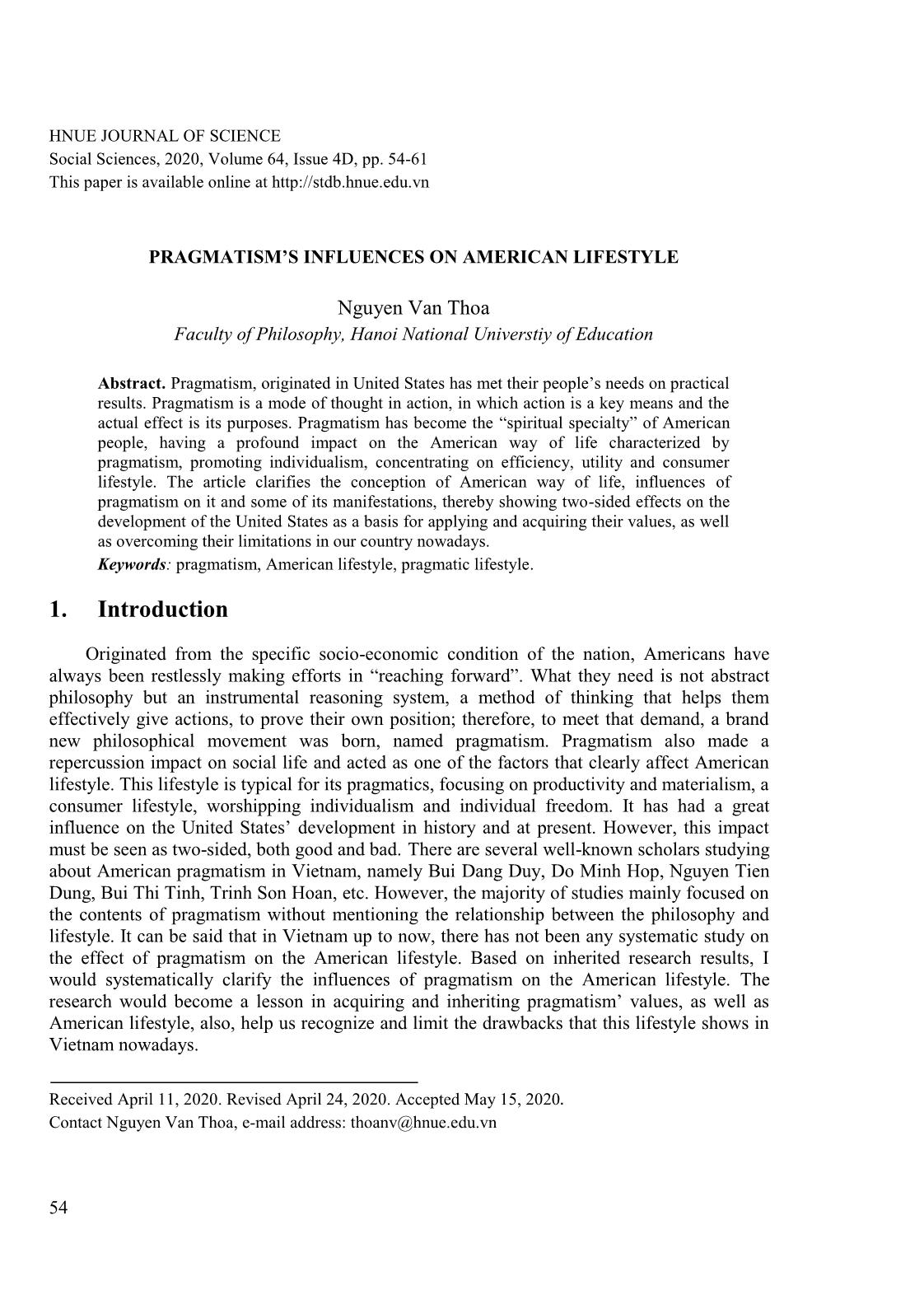
Trang 1
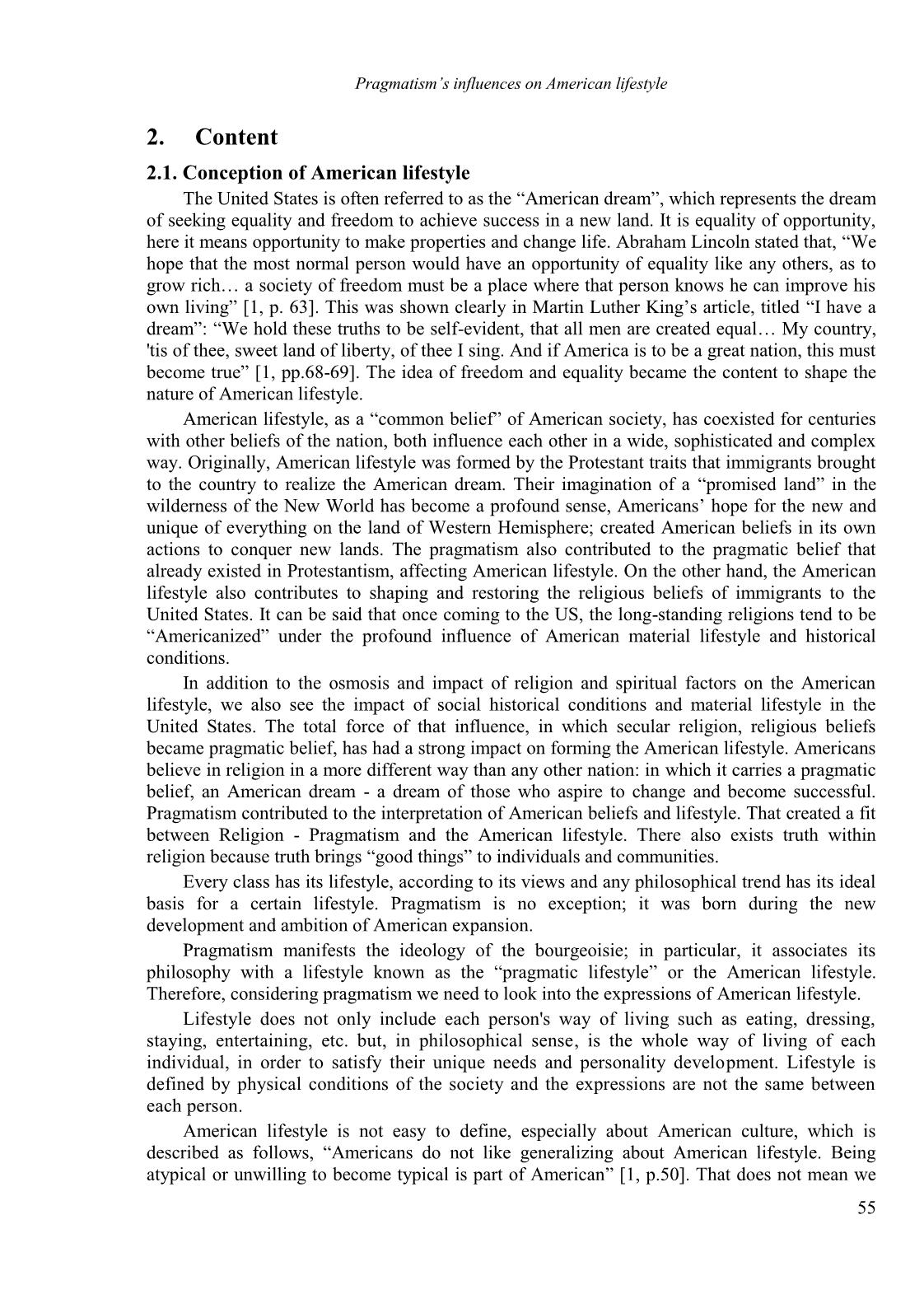
Trang 2
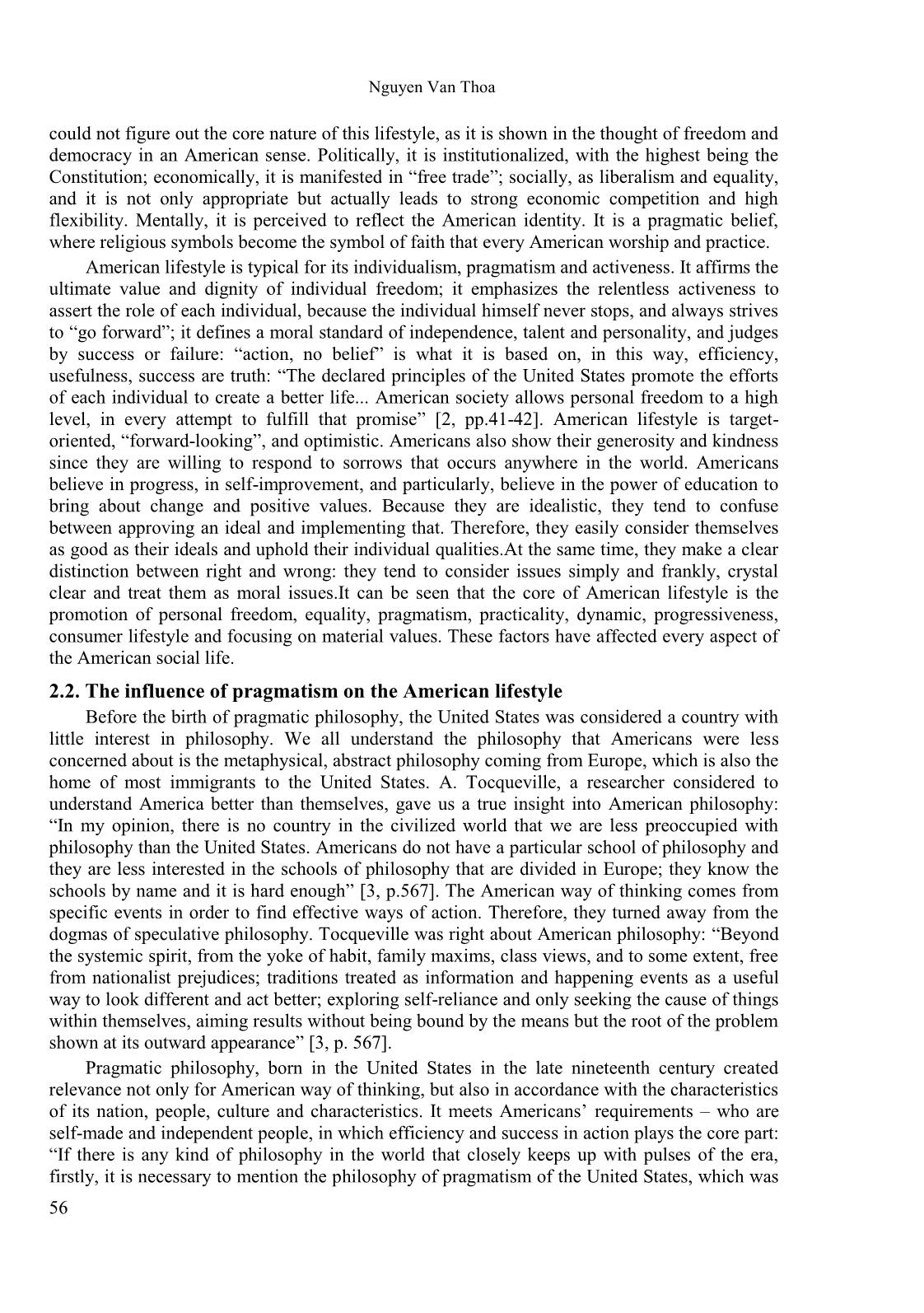
Trang 3
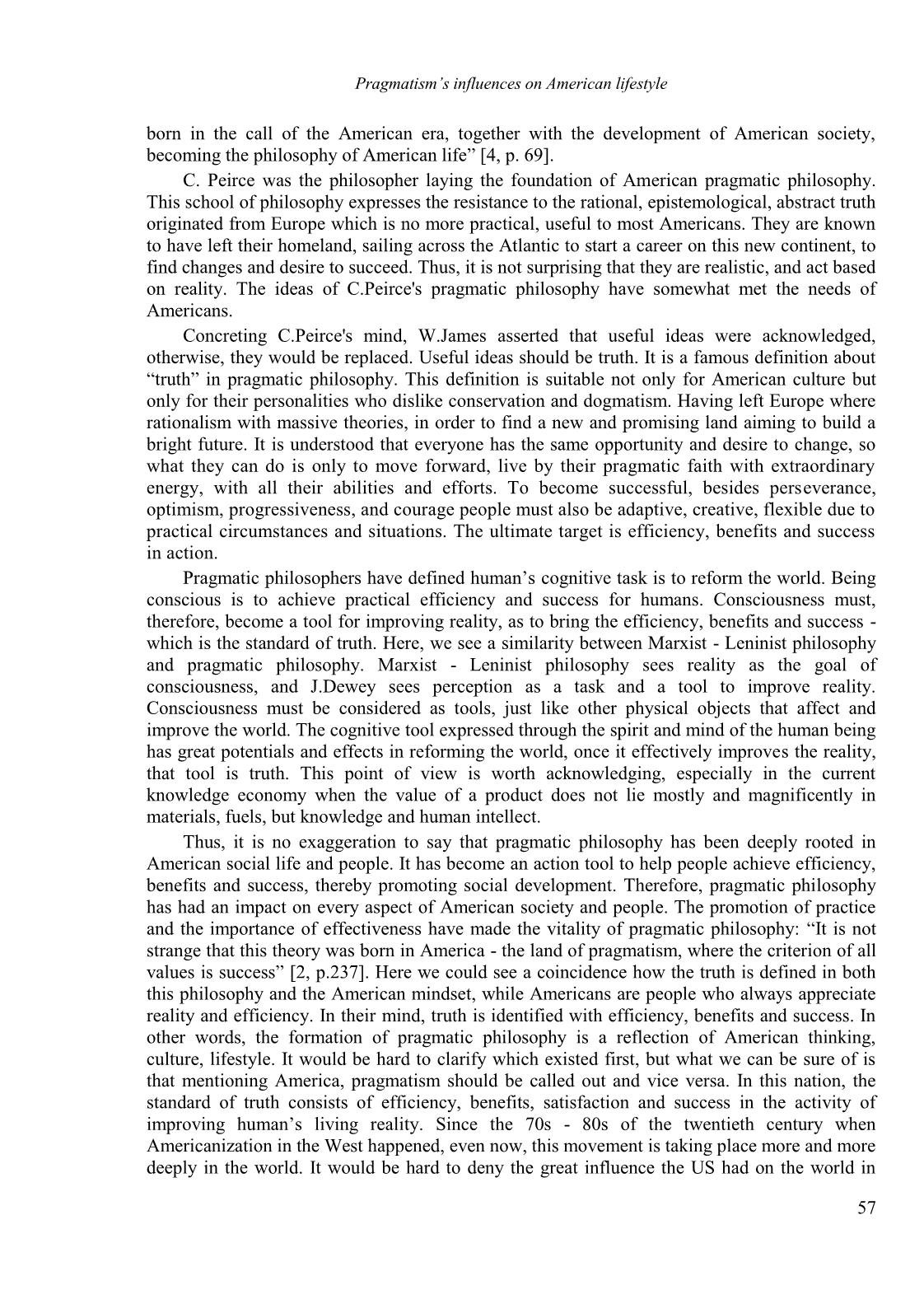
Trang 4
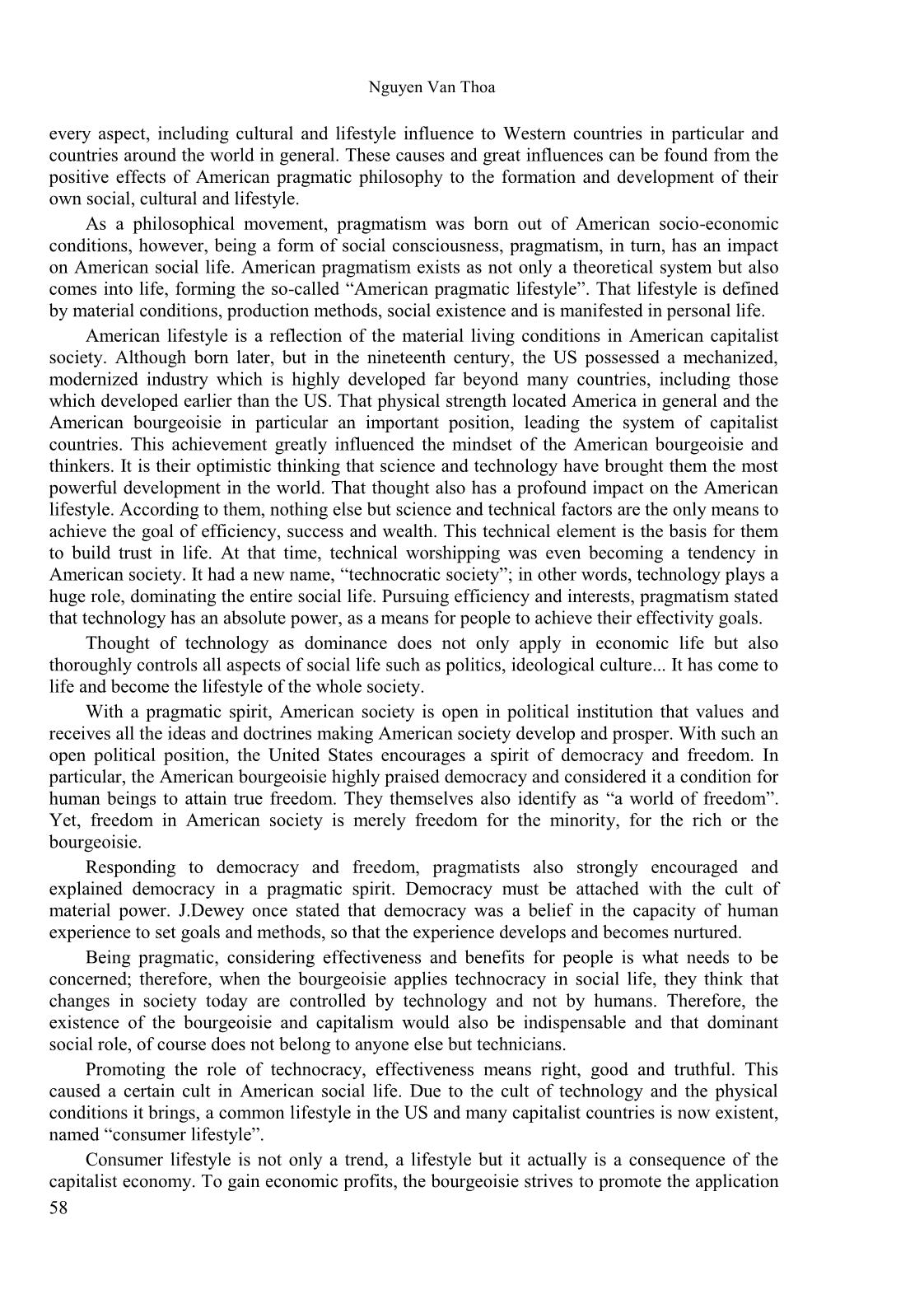
Trang 5
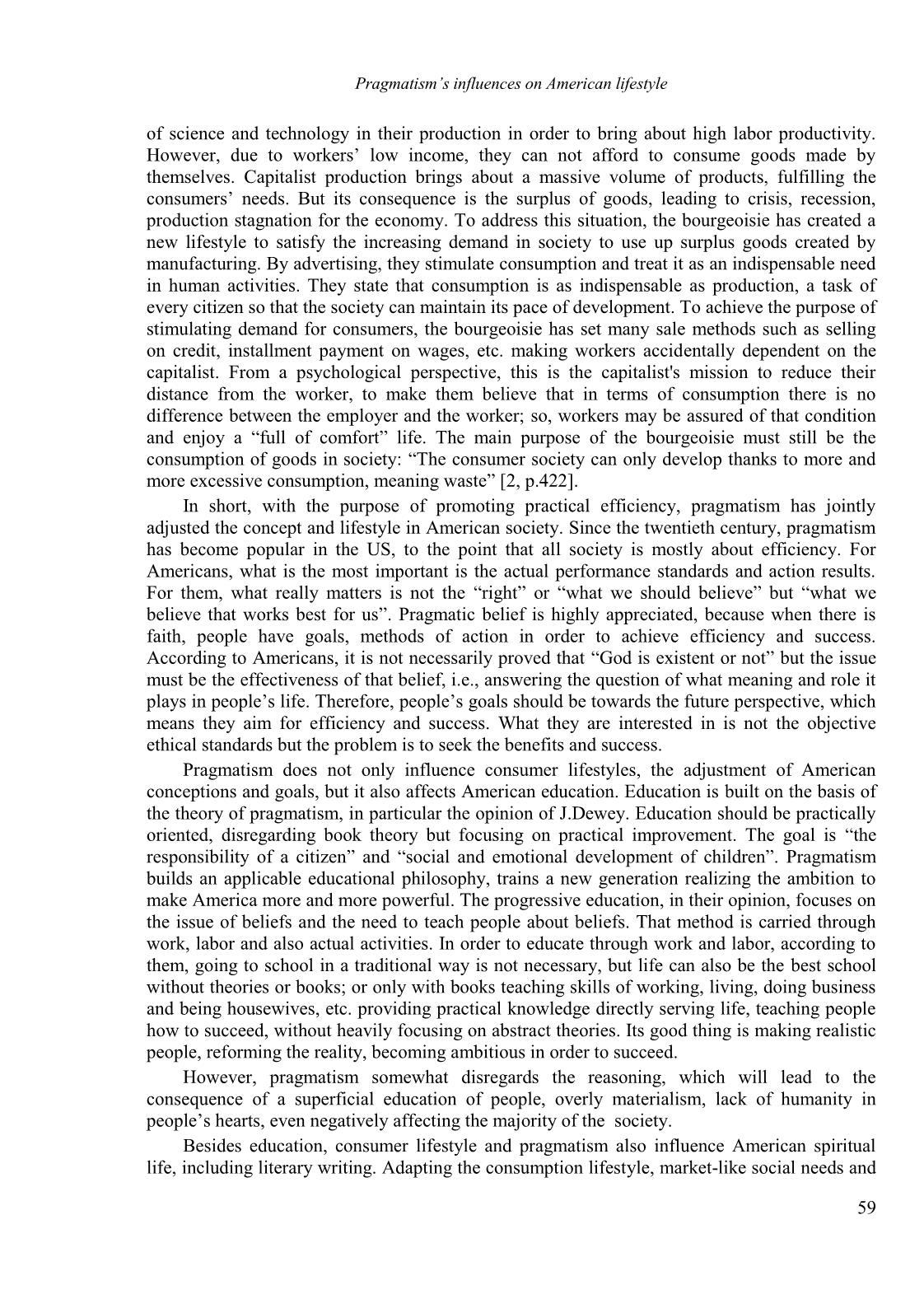
Trang 6
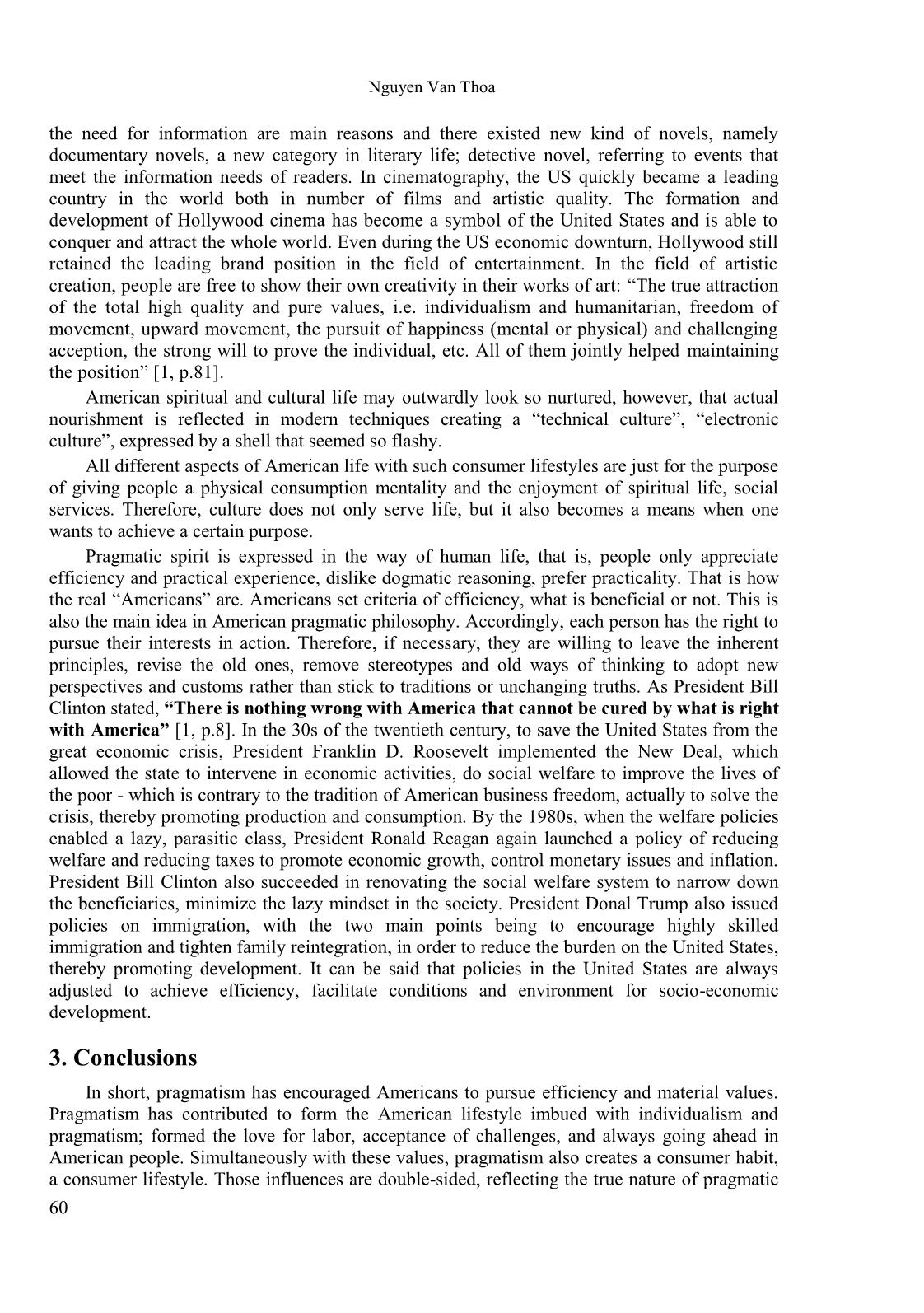
Trang 7
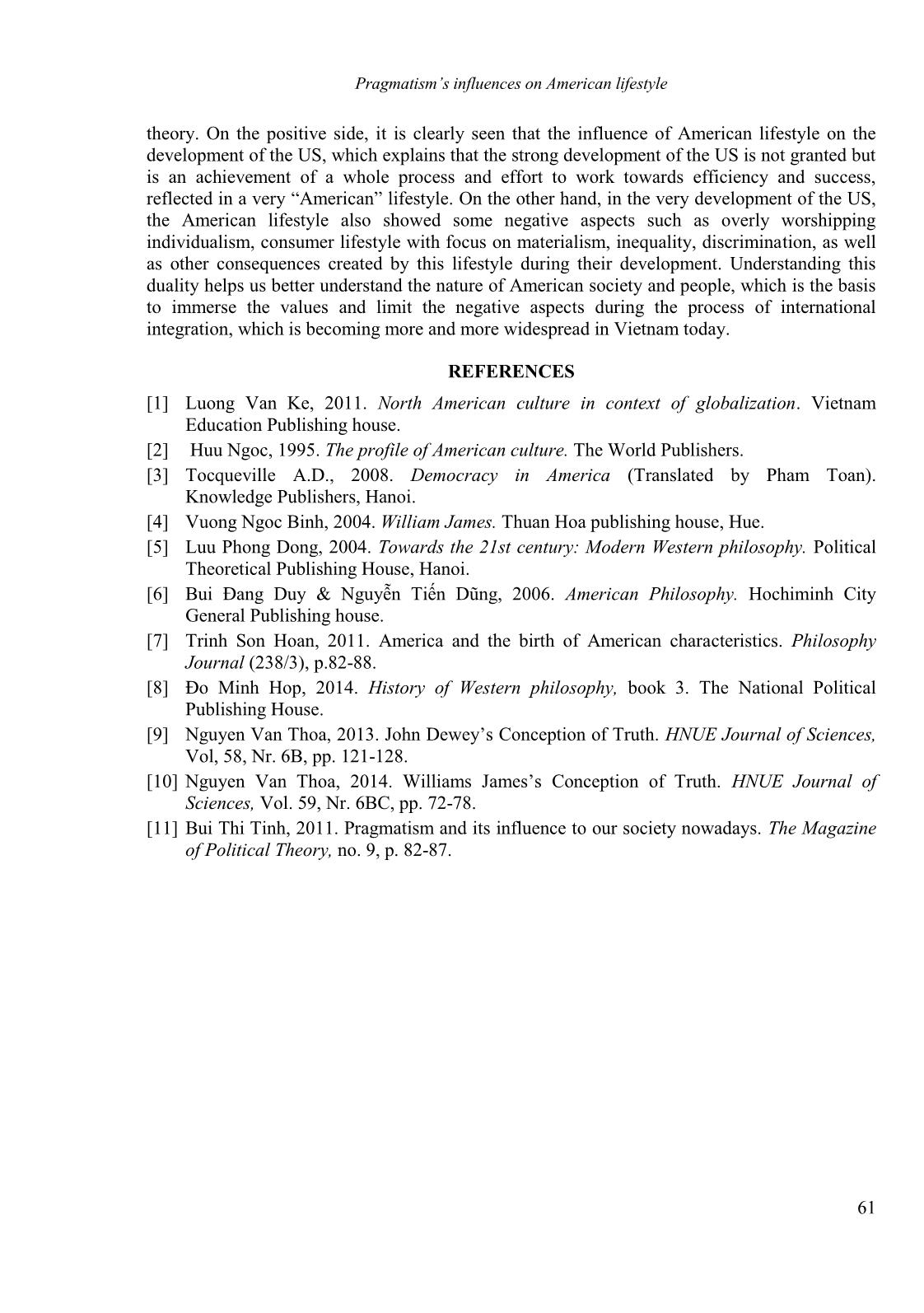
Trang 8
Tóm tắt nội dung tài liệu: Pragmatism’s influences on American lifestyle
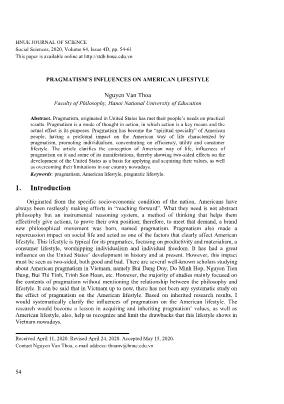
causes and great influences can be found from the positive effects of American pragmatic philosophy to the formation and development of their own social, cultural and lifestyle. As a philosophical movement, pragmatism was born out of American socio-economic conditions, however, being a form of social consciousness, pragmatism, in turn, has an impact on American social life. American pragmatism exists as not only a theoretical system but also comes into life, forming the so-called “American pragmatic lifestyle”. That lifestyle is defined by material conditions, production methods, social existence and is manifested in personal life. American lifestyle is a reflection of the material living conditions in American capitalist society. Although born later, but in the nineteenth century, the US possessed a mechanized, modernized industry which is highly developed far beyond many countries, including those which developed earlier than the US. That physical strength located America in general and the American bourgeoisie in particular an important position, leading the system of capitalist countries. This achievement greatly influenced the mindset of the American bourgeoisie and thinkers. It is their optimistic thinking that science and technology have brought them the most powerful development in the world. That thought also has a profound impact on the American lifestyle. According to them, nothing else but science and technical factors are the only means to achieve the goal of efficiency, success and wealth. This technical element is the basis for them to build trust in life. At that time, technical worshipping was even becoming a tendency in American society. It had a new name, “technocratic society”; in other words, technology plays a huge role, dominating the entire social life. Pursuing efficiency and interests, pragmatism stated that technology has an absolute power, as a means for people to achieve their effectivity goals. Thought of technology as dominance does not only apply in economic life but also thoroughly controls all aspects of social life such as politics, ideological culture... It has come to life and become the lifestyle of the whole society. With a pragmatic spirit, American society is open in political institution that values and receives all the ideas and doctrines making American society develop and prosper. With such an open political position, the United States encourages a spirit of democracy and freedom. In particular, the American bourgeoisie highly praised democracy and considered it a condition for human beings to attain true freedom. They themselves also identify as “a world of freedom”. Yet, freedom in American society is merely freedom for the minority, for the rich or the bourgeoisie. Responding to democracy and freedom, pragmatists also strongly encouraged and explained democracy in a pragmatic spirit. Democracy must be attached with the cult of material power. J.Dewey once stated that democracy was a belief in the capacity of human experience to set goals and methods, so that the experience develops and becomes nurtured. Being pragmatic, considering effectiveness and benefits for people is what needs to be concerned; therefore, when the bourgeoisie applies technocracy in social life, they think that changes in society today are controlled by technology and not by humans. Therefore, the existence of the bourgeoisie and capitalism would also be indispensable and that dominant social role, of course does not belong to anyone else but technicians. Promoting the role of technocracy, effectiveness means right, good and truthful. This caused a certain cult in American social life. Due to the cult of technology and the physical conditions it brings, a common lifestyle in the US and many capitalist countries is now existent, named “consumer lifestyle”. Consumer lifestyle is not only a trend, a lifestyle but it actually is a consequence of the capitalist economy. To gain economic profits, the bourgeoisie strives to promote the application Pragmatism’s influences on American lifestyle 59 of science and technology in their production in order to bring about high labor productivity. However, due to workers’ low income, they can not afford to consume goods made by themselves. Capitalist production brings about a massive volume of products, fulfilling the consumers’ needs. But its consequence is the surplus of goods, leading to crisis, recession, production stagnation for the economy. To address this situation, the bourgeoisie has created a new lifestyle to satisfy the increasing demand in society to use up surplus goods created by manufacturing. By advertising, they stimulate consumption and treat it as an indispensable need in human activities. They state that consumption is as indispensable as production, a task of every citizen so that the society can maintain its pace of development. To achieve the purpose of stimulating demand for consumers, the bourgeoisie has set many sale methods such as selling on credit, installment payment on wages, etc. making workers accidentally dependent on the capitalist. From a psychological perspective, this is the capitalist's mission to reduce their distance from the worker, to make them believe that in terms of consumption there is no difference between the employer and the worker; so, workers may be assured of that condition and enjoy a “full of comfort” life. The main purpose of the bourgeoisie must still be the consumption of goods in society: “The consumer society can only develop thanks to more and more excessive consumption, meaning waste” [2, p.422]. In short, with the purpose of promoting practical efficiency, pragmatism has jointly adjusted the concept and lifestyle in American society. Since the twentieth century, pragmatism has become popular in the US, to the point that all society is mostly about efficiency. For Americans, what is the most important is the actual performance standards and action results. For them, what really matters is not the “right” or “what we should believe” but “what we believe that works best for us”. Pragmatic belief is highly appreciated, because when there is faith, people have goals, methods of action in order to achieve efficiency and success. According to Americans, it is not necessarily proved that “God is existent or not” but the issue must be the effectiveness of that belief, i.e., answering the question of what meaning and role it plays in people’s life. Therefore, people’s goals should be towards the future perspective, which means they aim for efficiency and success. What they are interested in is not the objective ethical standards but the problem is to seek the benefits and success. Pragmatism does not only influence consumer lifestyles, the adjustment of American conceptions and goals, but it also affects American education. Education is built on the basis of the theory of pragmatism, in particular the opinion of J.Dewey. Education should be practically oriented, disregarding book theory but focusing on practical improvement. The goal is “the responsibility of a citizen” and “social and emotional development of children”. Pragmatism builds an applicable educational philosophy, trains a new generation realizing the ambition to make America more and more powerful. The progressive education, in their opinion, focuses on the issue of beliefs and the need to teach people about beliefs. That method is carried through work, labor and also actual activities. In order to educate through work and labor, according to them, going to school in a traditional way is not necessary, but life can also be the best school without theories or books; or only with books teaching skills of working, living, doing business and being housewives, etc. providing practical knowledge directly serving life, teaching people how to succeed, without heavily focusing on abstract theories. Its good thing is making realistic people, reforming the reality, becoming ambitious in order to succeed. However, pragmatism somewhat disregards the reasoning, which will lead to the consequence of a superficial education of people, overly materialism, lack of humanity in people’s hearts, even negatively affecting the majority of the society. Besides education, consumer lifestyle and pragmatism also influence American spiritual life, including literary writing. Adapting the consumption lifestyle, market-like social needs and Nguyen Van Thoa 60 the need for information are main reasons and there existed new kind of novels, namely documentary novels, a new category in literary life; detective novel, referring to events that meet the information needs of readers. In cinematography, the US quickly became a leading country in the world both in number of films and artistic quality. The formation and development of Hollywood cinema has become a symbol of the United States and is able to conquer and attract the whole world. Even during the US economic downturn, Hollywood still retained the leading brand position in the field of entertainment. In the field of artistic creation, people are free to show their own creativity in their works of art: “The true attraction of the total high quality and pure values, i.e. individualism and humanitarian, freedom of movement, upward movement, the pursuit of happiness (mental or physical) and challenging acception, the strong will to prove the individual, etc. All of them jointly helped maintaining the position” [1, p.81]. American spiritual and cultural life may outwardly look so nurtured, however, that actual nourishment is reflected in modern techniques creating a “technical culture”, “electronic culture”, expressed by a shell that seemed so flashy. All different aspects of American life with such consumer lifestyles are just for the purpose of giving people a physical consumption mentality and the enjoyment of spiritual life, social services. Therefore, culture does not only serve life, but it also becomes a means when one wants to achieve a certain purpose. Pragmatic spirit is expressed in the way of human life, that is, people only appreciate efficiency and practical experience, dislike dogmatic reasoning, prefer practicality. That is how the real “Americans” are. Americans set criteria of efficiency, what is beneficial or not. This is also the main idea in American pragmatic philosophy. Accordingly, each person has the right to pursue their interests in action. Therefore, if necessary, they are willing to leave the inherent principles, revise the old ones, remove stereotypes and old ways of thinking to adopt new perspectives and customs rather than stick to traditions or unchanging truths. As President Bill Clinton stated, “There is nothing wrong with America that cannot be cured by what is right with America” [1, p.8]. In the 30s of the twentieth century, to save the United States from the great economic crisis, President Franklin D. Roosevelt implemented the New Deal, which allowed the state to intervene in economic activities, do social welfare to improve the lives of the poor - which is contrary to the tradition of American business freedom, actually to solve the crisis, thereby promoting production and consumption. By the 1980s, when the welfare policies enabled a lazy, parasitic class, President Ronald Reagan again launched a policy of reducing welfare and reducing taxes to promote economic growth, control monetary issues and inflation. President Bill Clinton also succeeded in renovating the social welfare system to narrow down the beneficiaries, minimize the lazy mindset in the society. President Donal Trump also issued policies on immigration, with the two main points being to encourage highly skilled immigration and tighten family reintegration, in order to reduce the burden on the United States, thereby promoting development. It can be said that policies in the United States are always adjusted to achieve efficiency, facilitate conditions and environment for socio-economic development. 3. Conclusions In short, pragmatism has encouraged Americans to pursue efficiency and material values. Pragmatism has contributed to form the American lifestyle imbued with individualism and pragmatism; formed the love for labor, acceptance of challenges, and always going ahead in American people. Simultaneously with these values, pragmatism also creates a consumer habit, a consumer lifestyle. Those influences are double-sided, reflecting the true nature of pragmatic Pragmatism’s influences on American lifestyle 61 theory. On the positive side, it is clearly seen that the influence of American lifestyle on the development of the US, which explains that the strong development of the US is not granted but is an achievement of a whole process and effort to work towards efficiency and success, reflected in a very “American” lifestyle. On the other hand, in the very development of the US, the American lifestyle also showed some negative aspects such as overly worshipping individualism, consumer lifestyle with focus on materialism, inequality, discrimination, as well as other consequences created by this lifestyle during their development. Understanding this duality helps us better understand the nature of American society and people, which is the basis to immerse the values and limit the negative aspects during the process of international integration, which is becoming more and more widespread in Vietnam today. REFERENCES [1] Luong Van Ke, 2011. North American culture in context of globalization. Vietnam Education Publishing house. [2] Huu Ngoc, 1995. The profile of American culture. The World Publishers. [3] Tocqueville A.D., 2008. Democracy in America (Translated by Pham Toan). Knowledge Publishers, Hanoi. [4] Vuong Ngoc Binh, 2004. William James. Thuan Hoa publishing house, Hue. [5] Luu Phong Dong, 2004. Towards the 21st century: Modern Western philosophy. Political Theoretical Publishing House, Hanoi. [6] Bui Đang Duy & Nguyễn Tiến Dũng, 2006. American Philosophy. Hochiminh City General Publishing house. [7] Trinh Son Hoan, 2011. America and the birth of American characteristics. Philosophy Journal (238/3), p.82-88. [8] Đo Minh Hop, 2014. History of Western philosophy, book 3. The National Political Publishing House. [9] Nguyen Van Thoa, 2013. John Dewey’s Conception of Truth. HNUE Journal of Sciences, Vol, 58, Nr. 6B, pp. 121-128. [10] Nguyen Van Thoa, 2014. Williams James’s Conception of Truth. HNUE Journal of Sciences, Vol. 59, Nr. 6BC, pp. 72-78. [11] Bui Thi Tinh, 2011. Pragmatism and its influence to our society nowadays. The Magazine of Political Theory, no. 9, p. 82-87.
File đính kèm:
 pragmatisms_influences_on_american_lifestyle.pdf
pragmatisms_influences_on_american_lifestyle.pdf

